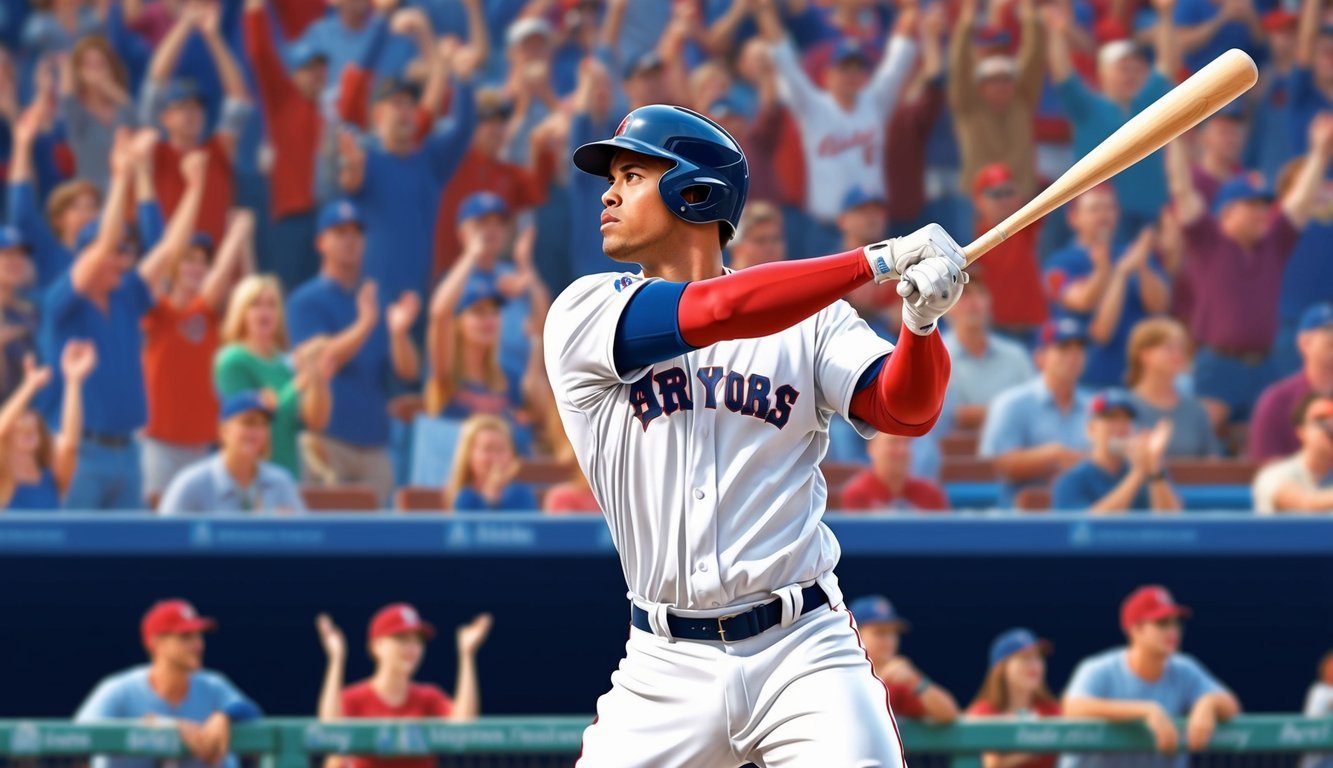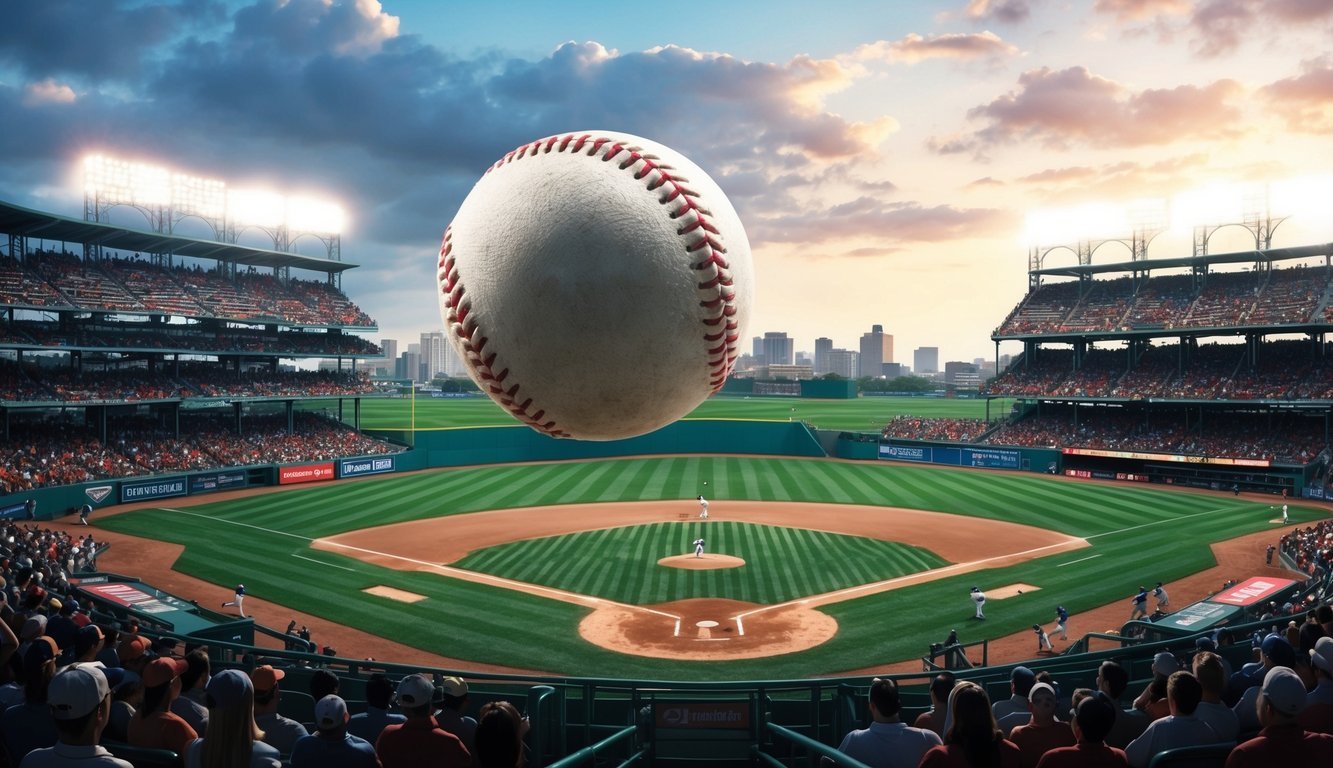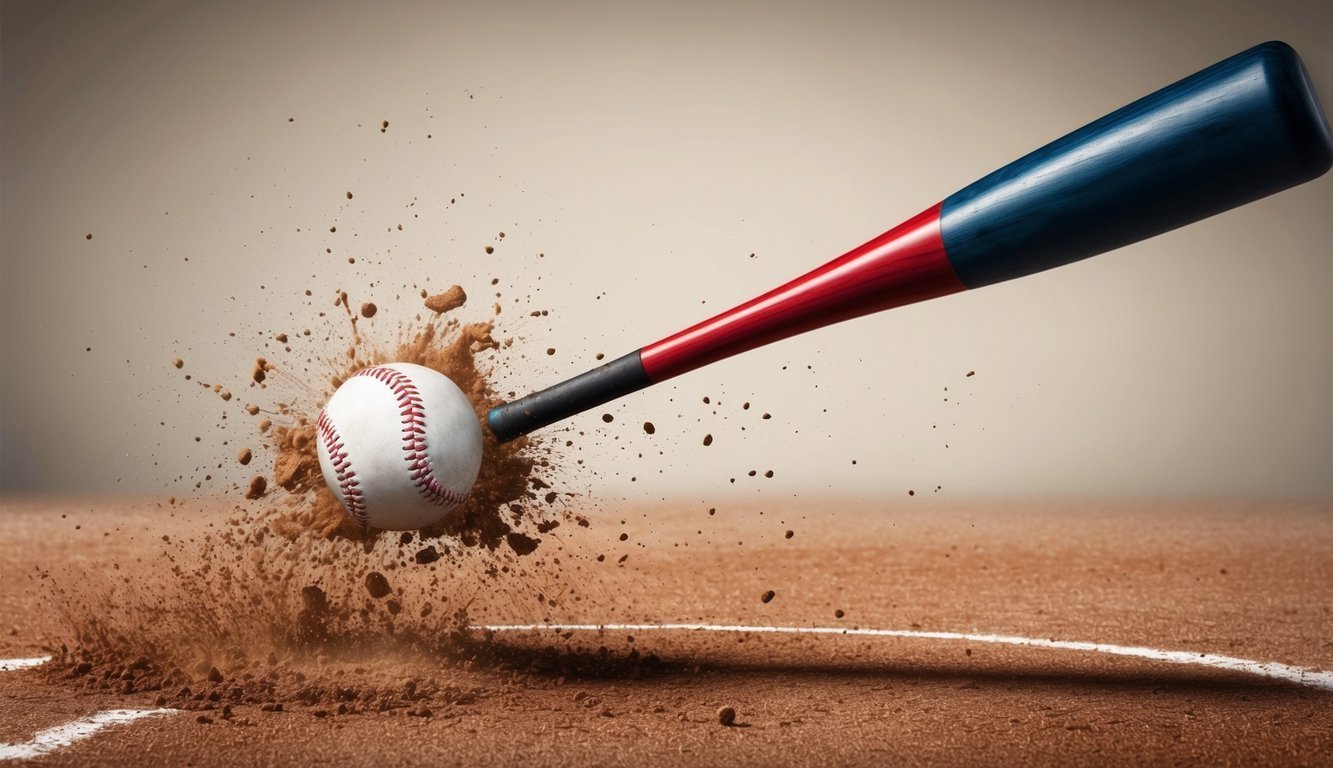Baseball fans love to debate who comes through in the clutch.
A clutch hitter is a player who consistently delivers key hits in high-pressure situations.
These are the batters who thrive when the game is on the line, with runners in scoring position or during late innings of close contests.
Clutch hitting combines skill, mental toughness, and the ability to perform under intense pressure. While some argue that clutch hitting is more myth than reality, certain players have built reputations for delivering in crucial moments.
Names like David Ortiz, Derek Jeter, and Reggie Jackson are often cited as legendary clutch performers.
Measuring clutch performance isn’t straightforward.
Traditional stats like batting average with runners in scoring position provide some insight.
More advanced metrics attempt to quantify a player’s impact in high-leverage situations.
Regardless of the measure used, clutch hitters captivate fans and inspire confidence in their teammates when the game hangs in the balance.
Understanding Clutch Hitting
Clutch hitting is a fascinating aspect of baseball that captivates fans and sparks debates among analysts.
It’s the ability to deliver when the stakes are highest, turning ordinary players into legends.
Defining the Clutch Hitter
A clutch hitter in baseball is a player who consistently performs well in high-pressure situations.
These moments often occur late in the game, with runners in scoring position, or during crucial playoff matchups.
Clutch hitters are known for their mental toughness and ability to stay calm under pressure.
Some famous examples of clutch hitters include:
- David Ortiz
- Derek Jeter
- Reggie Jackson
These players built reputations for coming through when their teams needed them most.
Clutch hitting isn’t just about getting hits; it’s about producing runs and changing the outcome of games in critical moments.
The Science Behind Clutch Performance
The science of clutch hitting is a subject of ongoing debate in the baseball community.
Some researchers argue that clutch hitting is a skill that certain players possess, while others claim it’s more a result of randomness and sample size.
Sabermetric analysis has attempted to quantify clutch performance using various metrics.
These include:
- Clutch score
- Win Probability Added (WPA)
- Situational OPS
Studies have shown mixed results when trying to identify consistent clutch hitters across seasons.
Some scientists suggest that clutch performance may be linked to psychological factors like focus and stress management.
The debate continues, with traditionalists valuing clutch reputation and sabermetricians seeking statistical proof.
Regardless of the scientific consensus, the idea of the clutch hitter remains an integral part of baseball’s narrative and appeal.
Legendary Clutch Hitters in Baseball
Baseball history is filled with players who shined brightest when the pressure was highest.
These clutch hitters etched their names into the sport’s lore with timely hits and unforgettable performances.
Profiles of Clutch Legends
David Ortiz, known as “Big Papi,” stands out as one of the greatest clutch hitters ever.
He played 20 seasons, mostly with the Boston Red Sox, amassing 2,023 hits and 439 home runs.
Ortiz’s ability to deliver in crucial moments made him a fan favorite.
Derek Jeter earned the nickname “Mr. November” for his postseason heroics with the New York Yankees.
His calm demeanor and consistent performance under pressure made him a true clutch player.
Reggie Jackson, dubbed “Mr. October,” built his legacy on spectacular World Series performances.
His three home runs in Game 6 of the 1977 World Series remain one of baseball’s most iconic moments.
Iconic Clutch Moments
Kirk Gibson’s pinch-hit home run in the 1988 World Series is often considered one of the most dramatic clutch hits ever.
Despite injuries, Gibson limped to the plate and hit a game-winning homer off Dennis Eckersley.
This unforgettable moment not only solidified Gibson’s legacy in baseball but also showcased the unpredictable nature of the sport, where heroes can emerge in the most unexpected circumstances.
Meanwhile, players like Willie Mays, often regarded as one of the best center fielders in baseball history, have inspired countless fans and future athletes with their extraordinary feats on the field.
The excitement of those crucial moments continues to resonate, reminding us of the thrill of the game.
Joe Carter’s walk-off home run to win the 1993 World Series for the Toronto Blue Jays is another unforgettable clutch moment.
His ninth-inning blast off Mitch Williams clinched the series and sent the crowd into a frenzy.
Albert Pujols has delivered numerous clutch hits throughout his career.
One standout moment was his three-homer game in the 2011 World Series, showcasing his ability to rise to the occasion on baseball’s biggest stage.
Statistical Analysis of Clutch Hitting

Analyzing clutch hitting statistically reveals complexities in measuring this elusive skill.
Researchers have examined various metrics and debated the role of chance in clutch performance.
Measuring Clutch with Advanced Metrics
Statisticians have developed sophisticated metrics to quantify clutch hitting.
OPS (on-base plus slugging) in high-leverage situations is one common measure.
Some analysts compare a player’s overall batting average to their performance in late-inning pressure scenarios.
Bill James, a pioneering baseball statistician, has explored clutch hitting extensively.
He’s examined players like Mark Grace and Alex Rodriguez, looking for consistent patterns in their clutch stats.
Advanced metrics aim to isolate true clutch skill from random variation.
However, finding strong year-to-year correlations in clutch performance has proven challenging for researchers.
Debating the Role of Luck
The impact of chance on clutch hitting statistics sparks lively debate.
Some argue that perceived clutch ability is largely a mirage created by small sample sizes and selective memory.
Tom Tango, a respected baseball analyst, has highlighted how random fluctuations can create the illusion of clutch talent.
His work shows that even skilled hitters experience natural ups and downs in high-pressure situations.
Critics of clutch hitting as a repeatable skill point to studies showing weak correlations between clutch performance across seasons.
They argue that a player’s overall batting skill is a better predictor of clutch success than past clutch results.
Clutch Hitting Strategies

Successful clutch hitting requires a combination of technical skills and mental fortitude.
Players who excel in high-pressure situations often employ specific approaches and mindsets to deliver when it matters most.
Approaches at the Plate
Clutch hitters often adjust their batting stance slightly in crucial moments.
They may choke up on the bat for better control or widen their stance for increased stability.
Many focus on making solid contact rather than swinging for the fences.
Some players prefer to be aggressive early in the count, looking for a first-pitch fastball to drive.
Others take a more patient approach, working deeper into counts to tire the pitcher or force a mistake.
Recognizing pitch patterns becomes crucial.
Experienced hitters study pitchers’ tendencies in clutch situations, giving them an edge when it matters most.
Mental Toughness and Preparation
A calm, confident mindset is key for clutch hitting success.
Players often develop pre-at-bat routines to center themselves and block out distractions.
This might include visualization techniques or deep breathing exercises.
Mental preparation starts long before game day.
Many clutch hitters spend hours studying opposing pitchers and reviewing their own past performances in high-pressure situations.
Consistency in approach is vital.
The best clutch hitters treat these moments like any other at-bat, avoiding the temptation to change their style drastically under pressure.
Coaches play a crucial role in developing mental toughness.
They work with players to build confidence and resilience, helping them stay focused when the game is on the line.
The Impact of Clutch Performances

Clutch performances in baseball can dramatically shift the momentum of a game and leave a lasting impression on fans and players alike.
These high-pressure moments often define careers and create unforgettable memories.
Influence on Team Dynamics
Clutch hitters boost team morale and inspire confidence in their teammates.
A walk-off home run or a game-winning RBI can energize a clubhouse for days.
Power hitters who consistently deliver in late innings become the go-to players in tight situations.
Players who excel with the bases loaded or in postseason games earn respect from both teammates and opponents.
Their ability to stay calm under pressure sets an example for younger players.
Pitchers who can shut down opposing teams in crucial moments are equally valuable.
A key strikeout or double play in the ninth inning can be just as impactful as a clutch hit.
Fan Perception and Legacy
Fans adore players who come through in the clutch.
These moments create lasting memories and often define a player’s legacy.
The Red Sox’s David Ortiz became a Boston icon largely due to his clutch performances.
Walk-off hits, especially grand slams, are some of the most exciting plays in baseball.
They turn losses into victories and send fans home happy.
These moments are replayed for years on highlight reels.
Clutch performances in big games, particularly in the postseason, can elevate a good player to legendary status.
Reggie Jackson’s three home runs in the 1977 World Series cemented his nickname “Mr. October.”
Even regular hitters who deliver in key situations can become fan favorites.
Their ability to rise to the occasion in pressure-packed moments endears them to the crowd and adds excitement to every at-bat.
